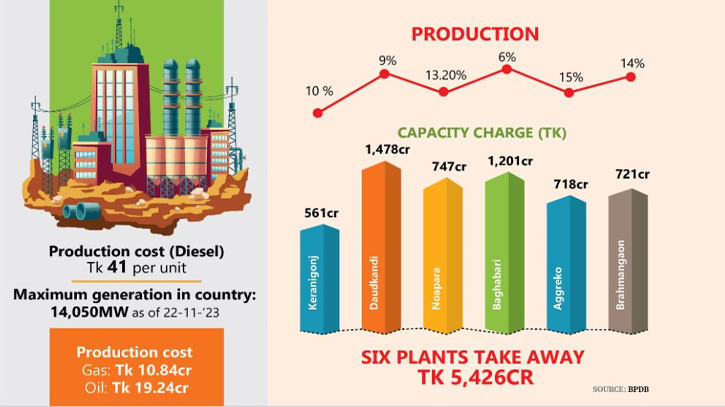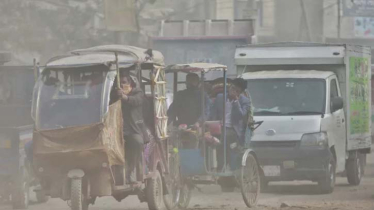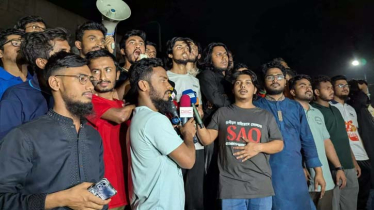
Photo : Messenger
Country’s fast-track power plants have been found to be generating merely 15 percent of their designated capacity at present although the plants in question are charging the entire 100 percent as their capacity charge.
It has been revealed that the quick rental power plants have been marginally utilised over the last four years due to lower demand and high production costs, while the companies still pocketed Tk 6,990 crore according to the agreement, raises significant concerns about the terms and conditions of the contracts.
The government, in a bid to rapidly enhance the country's electricity supply, implemented a strategy in 2010 that involved engaging the private sector in power generation. This was carried out under the 'Fast Power and Energy Supply Special Provision,' which bypassed the traditional tendering procedure.
The officials concerned said the government in the fiscal year 2017-18 approved six diesel-based power plants totaling 1,000 MW in Keraniganj without going through the tendering process. This initiative was carried out under the fast supply of electricity and fuel. However, in the subsequent years, specifically in 2021-22, the maximum utilisation of these plants averaged only 15 percent.
According to the Power Development Board (BPDB), Pangaon-300MW oil-based power plant in Keraniganj, in the year 2021-22, generated only 30MW, which is only 10 percent of the capacity. The company has submitted a bill amounting Tk 1,063 crore. Of this total amount, they asked Tk 561 crore as capacity charge.
Earlier, US-based APR charged Tk2,088 crore generating only 0.4 percent of the total capacity in 2019-20 and 2.30 percent in 2018-19.
Experts in the field raised concerns – thereby suggesting that these companies were approved under political considerations and that individuals involved may have had close ties to the government.
When asked, Professor Shamsul Alam told The Daily Messenger that the ministry has approved companies to potentially legalise corruption.
Furthermore, the challenge of having to pay capacity charges even when the generation from gas has increased to 17,000MW and the need for rental power has diminished underscores potential contractual issues.
“To legalise corruption, the ministry has approved the companies. Now, even when generation from gas raised to 17,000MW and we don’t need the rental, we are bound to pay the capacity charge as this provision was included in the contract papers.”
However, the government claims that diesel-based centers are approved to meet urgent needs. The plants served well during last year's fuel shortage. However, at the end of this year, these plants will no longer be operated.
State Minister for Power and Energy Nasrul Hamid said, “Diesel is needed to diversify the fuel in power generation. Apart from that, at the time when the plants were approved, big power plants like Rampal, Payra did not come into production. After the expiry of the period, the plants will not be operated anymore.”
Of the six diesel plants, two are of Bangla Track. Among them, the 200 MW plant at Daudkandi in Cumilla came into production on 27 April 2018. The other is 100 MW at Noapara in Jashore, which came into production on 8 April 2018. Apart from this, Paramount B of 200 MW in Baghabari, Sirajganj was launched on 19 February 2019. Bangla Track owns 49 percent of Track Energy.
The Baghabari started operation in 2019-20, utilising 6 percent of its capacity. So far, a total of Tk 1, 201 crore capacity charge has been received in FY 2018-19 to 2021-22.
Daudkandi 200MW utilise 9 percent of its capacity and made Tk1,478 crore as capacity charge.
Noapara has the highest utilisation, 13.20 percent and received Tk 747 crore as the capacity charge.
US-based Aggreko has two 100 MW capacity power plants. One of these came into production at Orahati plant in Keraniganj on 29 June 2018. The other one was launched at Brahmangaon in Keraniganj on 30th May 2018.
Orahati center has utilised 3.97, 0.72, 4 and 15 percent of its capacity from FY 2018-19 to 2021-22 respectively. They have received Tk 718 crore as capacity charge. And the Brahmangaon plant has been running at 3.38, 0.59, 3 and 14 percent of its capacity in the last four financial fiscal years respectively. The capacity charge behind the plants is Tk 721 crore.
As a result, an average production cost was Tk 40. 99 per unit. Thus, Power Development Board (PDB) incurred a loss of over Tk 35 per unit.
There is an allegation that a syndicate headed by a member of the Special Provisions Project Sanctions Committee mainly pressures the government to approve the plants.
There is allegation that a syndicate, reportedly headed by a member of the Special Provisions Project Sanctions Committee, pressuring the government to approve power plants raises serious concerns about the integrity and transparency of the approval process.
Messenger/Sun Yath








